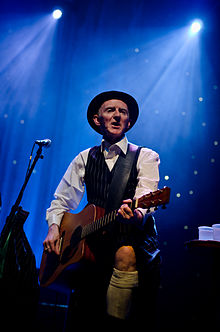Philip Chevron

Philip Chevron , actually Philip Ryan , (born June 17, 1957 in Dublin , † October 8, 2013 there ) was an Irish singer , songwriter and guitarist . He became known as the guitarist of the Irish-English folk-punk band The Pogues .
Life
In the mid-1970s, Chevron founded the punk rock band The Radiators from Space , with which he reached number 17 in the Irish charts with the title Television Screen , with no financial success. They organized a punk - Festival in Dublin, where security proved to be a big problem. After a bystander was killed, hardly anyone noticed the radiators. After the Radiators broke up, Chevron lived in London , where he befriended Shane MacGowan , with whom he worked for a while in a record store.
After the release of the Pogues debut album Red Roses for Me, Philip was to replace Jem Finer for a short time , whose wife Marcia had their second child and who therefore could not take part in the first Pogues tour outside the UK . Although he had never played the banjo before, he agreed. After the tour, Chevron stayed with the Pogues because MacGowan no longer wanted to play guitar .
In 1989, Chevron took part in the production of an album in memory of Phil Lynott , which was released in two different versions in 1989 and 1991 under the title Ode To A Black Man . With Mary Coughlan he sang the title with the group LILT on the charity album For The Children . Chevron produced a solo version of Thousands are sailing for the BBC production on Irish musicians Bringing It All Back Home .
Although Chevron worked in the shadow of MacGowan during his time with the Pogues, he also enjoyed success as a songwriter . He wrote popular ballads at the time such as Thousands are Sailing and Lorelei .
Mainly known as a guitarist , Chevron was also a very good banjo player , which he demonstrated on the third album of the Pogues If I Should Fall From Grace with God . Chevron left the Pogues in 1994.
In 2003 he called the Radiators back to life (Plan 9) to release the album Trouble Pilgrim in 2006 - with ex-Pogue's bassist Cait O'Riordan , among others . The album includes a tribute to his friend Joe Strummer .
In recent years, Chevron has become something of the unofficial spokesman for the Pogues, answering many fan questions on the forum. In 2004, the Pogues' studio albums were digitally revised under his supervision and brought onto the market with additional pieces. He has toured regularly with the Pogues since the reunification of the Pogues in 2001.
In June 2007 it was announced on the Pogues website that Philip Chevron had locally advanced esophageal cancer . In the spring of 2008 it was announced that he had recovered and, to his astonishment, his hearing had returned to almost the same level as it was before treatment. He took part in the 2008 tour of the United States and was able to sing Thousands Are Sailing at all concerts until 2012 . After a successful tour of Australia and Japan , however, he had to stop singing at the start of the tour of Europe.
Since 2005 he has worked with radio critic Declan Lynch on a musical about an Irish-American boxer .
On May 15, 2013, Chevron announced that a tumor had recurred that was inoperable due to its location . He was quoted with " This time the cancer is lethal " ( German : "This time the cancer is deadly"). Philip Chevron died on October 8, 2013 at the age of 56.
Web links
- The Pogues - official homepage
- The Radiators from Space - official homepage
- Philip Chevron in the Internet Movie Database (English)
Individual evidence
- ↑ Philip Chevron ( en ) In: pogues.com . Retrieved July 20, 2011.
- ^ Brian Boyd: Pogues guitarist Philip Chevron dies after long illness. In: The Irish Times , October 8, 2013.
| personal data | |
|---|---|
| SURNAME | Chevron, Philip |
| ALTERNATIVE NAMES | Ryan, Philip (real name) |
| BRIEF DESCRIPTION | Irish singer, songwriter and guitarist |
| DATE OF BIRTH | June 17, 1957 |
| PLACE OF BIRTH | Dublin |
| DATE OF DEATH | October 8, 2013 |
| Place of death | Dublin |
